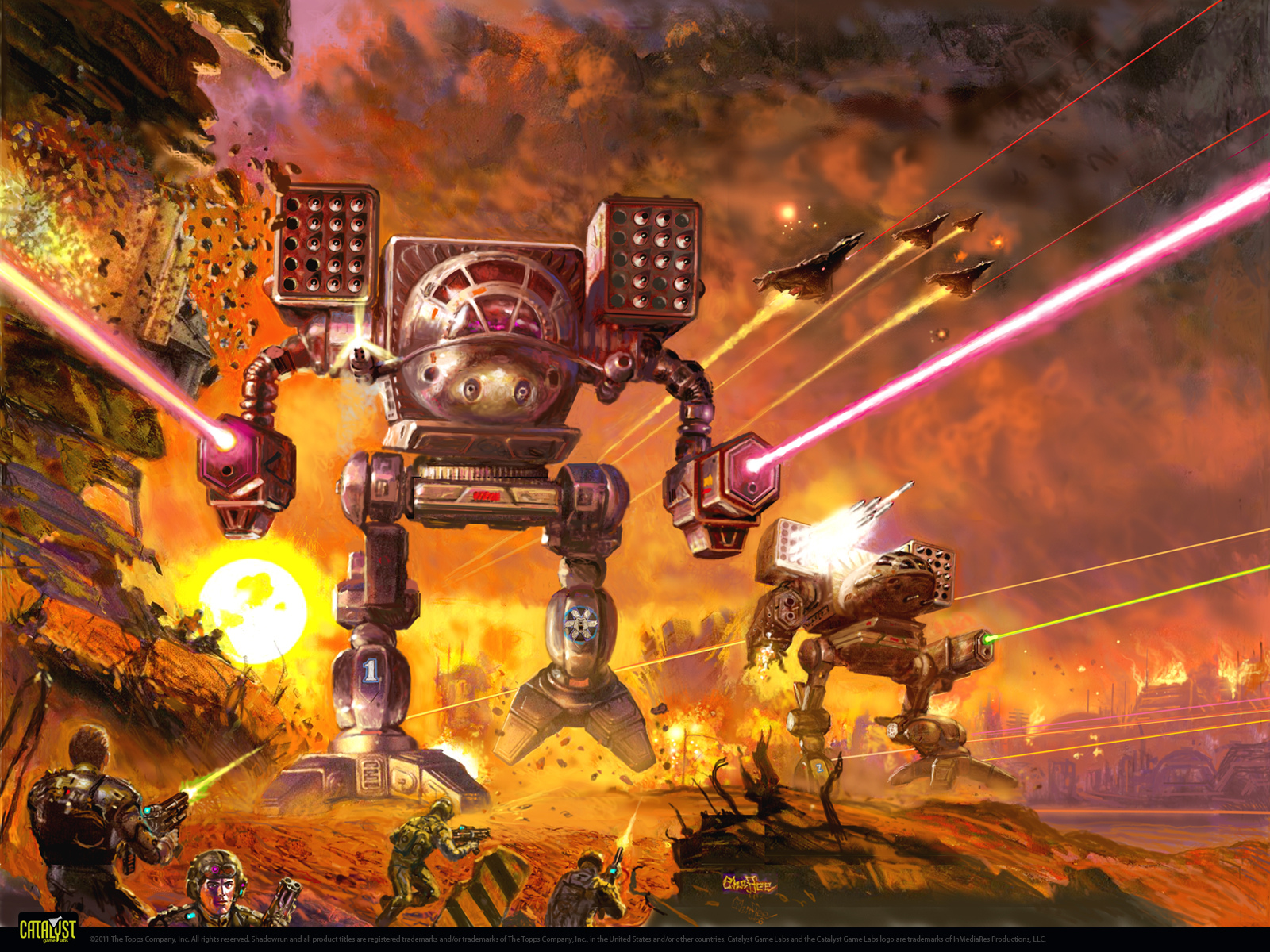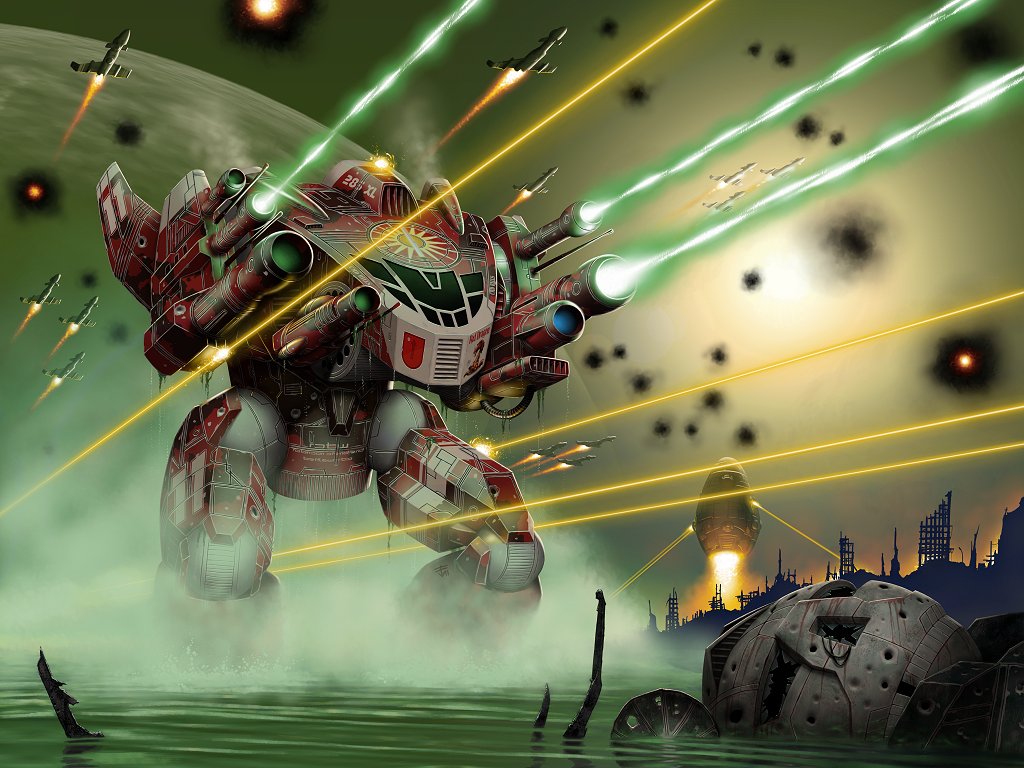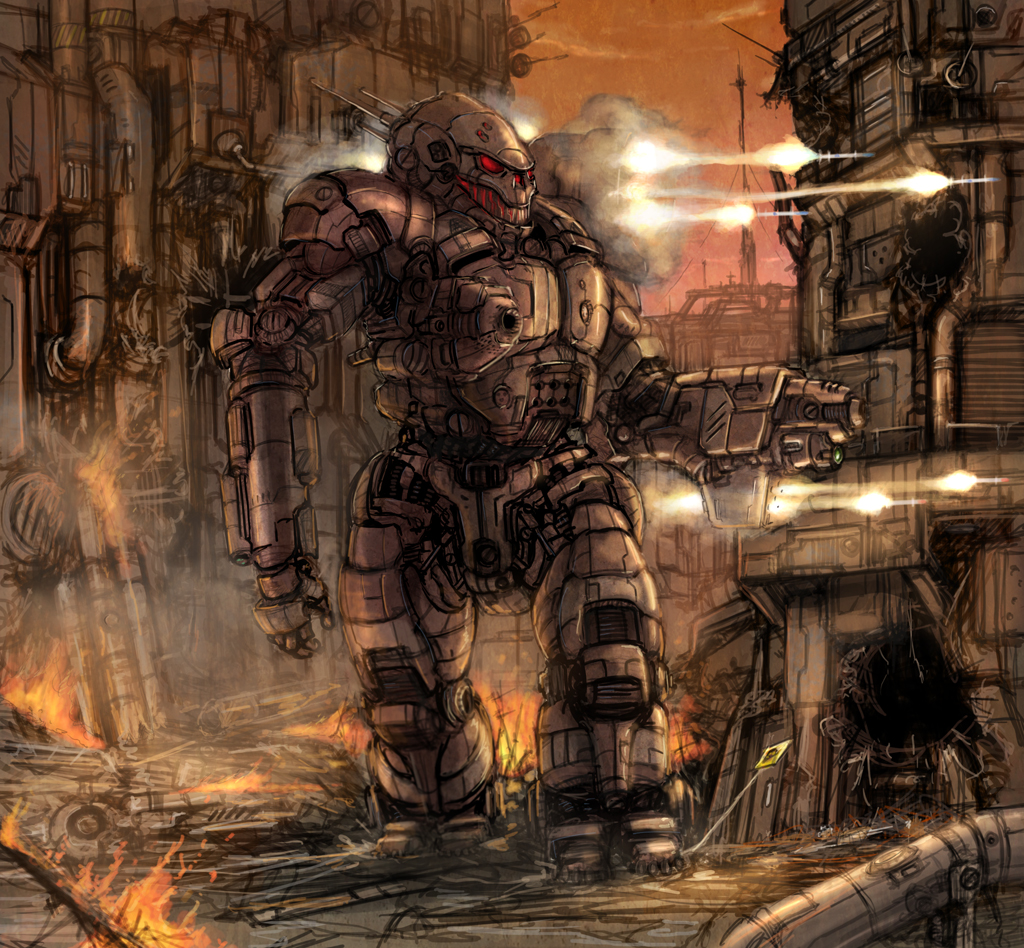BattleTech CCG: Commander's Edition by ThisIsNoZaku
Single Post
Original SA post
Here's a change of pace.
The BattleTech CCG: Commander's Edition
What's BattleTech?
BattleTech was, and still is, a tabletop miniature war/board game first released in the 1980's. Originally by FASA, it is now owned by Catalyst Game Labs.
It has a wide variety of supplementary and side materials, including multiple computer games in a variety of genres (most famous being the MechWarrior games) and tie-in novels (of which I have read quite a lot many years ago).
As it is a game with such a long history in the real world, it has an extremely long and sprawling one in-universe. Only, I'm not going to go into it, for two reasons: either you are way more
 about BattleTech than me, enough to already know it, or you aren't and you'll be too distracted to care by this:
about BattleTech than me, enough to already know it, or you aren't and you'll be too distracted to care by this:



The name for these lovely death-dealers is
BattleMech
(often shortened to 'Mech, including the apostrophe). These aren't your
candy-ass
,
delicate
,
graceful
mecha out of your Japanese animes*

*
Let's see who spots the in-joke among these pictures
'Mechs are walking tanks, big and lumbering. Granted, they range from fast and fragile 20-tonners to hulking behemoth 100-tons, but real 'Mechs can't fly (many can jump however), don't have magical force fields and don't use beam swords (some have regular metal melee weapons, but they're weird).
What is the best way to experience the deep history of this universe, to be enthralled by the tales of bravery and intrigue among the stars, the heart-pounding adrenaline of a battle between latter-day knights whose steeds, weapons and armor are enormous walking death machines?
A motherfucking collectible card game.
I'll be doing this write up from the Commander's Edition rulebook, in the order I find stuff. This game was first released 17 years ago now (designed by Richard Garfield and produced by WotC, no less) and has been out of print for 12.
Overview
Each players deck is called their Stockpile, and you win when your opponent has no cards left in their Stockpile. You can remove cards from the opponents Stockpile by attacking it.
There are three types of cards: Units, Command Cards and Mission cards.
Units
are what you attack with and encompass your 'Mech forces and other front line combatants such as vehicles and "Battle Armor," squads of soldiers in powered combat suits.
Command
cards are support resources you use to build your units and gain other effects. Command cards can be Resources, that let you build units and play cards, Enhancements that improve other cards and Pilots that turn your 'Mechs all Ace Custom.
Mission
cards are the instants and sorceries to the Units creatures and Resources Lands/Artifacts/Enchantments in Magic terms. They are played during "Missions" (combat) to get a temporary but hopefully decisive effect.
Some cards are Unique, meaning you can only have a single copy in your deck.
Assets
Assets are "rear lines" resources that you possess to help you wage war. They are represented by letters:
A
is for
Assembly
, state-of-the-art repair and construction technology.
L
is for
Logistics
, for communication and transportation techniques.
M
is for
Munitions
, the knowledge and equipment to produce large quantities of ammunition..
T
is for
Tactics
, training and the skill at directing your forces deftly.
P
is for
Politics
, representing the civilian side of the war effort and "soft(er) power"
You get Assets mostly from Command cards you have in play. The usefulness of assets is that they make certain cards cheaper; some cards will have, along the side, a number followed by one of the letters. This means that if you don't have the indicated Asset, you must pay that much extra to play the card.
Assets don't stack; you either have an Asset or you don't.
And wow, we haven't seen anything about how we pay for stuff and already we're talking about things that can modify it.
All the Assets except Politics also give a special ability you can use, to be detailed late.
Playing Area
Your play area is divided into a bunch of zones: the Stockpile region, containing a players Stockpile and it's defending units; your Construction region where you keep your Units and Command cards while you play them. You can make partial payments on them, spending resources over multiple turns to pay for especially expensive ones; your Command post where you keep all your Command Cards; and the Patrol region where all of your 'Mechs "in the field" are. In addition you have the Scraphead, the games name for the discard. (discarding or destroying cards is called Scrapping).
Starting a Game
You need 2+ players. Everyone needs a deck of
no more
than 60 cards. You also need markers and six sided dice, enough for everyone.
Each turn has six steps:
Untap Phase
There are things that tap your stuff:
-
Sending a unit on a mission
-
Blocking another player's attack with a unit
-
Using an ability with a tap symbol
Draw Phase
Draw two cards, except for the first player on the first turn, who draws one.
Deploy Phase
In this phase you deploy stuff you've constructed, pay to construct under construction stuff and activate fully paid stuff.
To deploy a card, put it face down in your construction region face down. You can reveal any under construction cards at any time and you can deploy two cards per turn.
To construct a card, you need to put a number of construction counters on it equal to it's construction cost. This cost is equal to it's base construction cost, plus any extras from Assets it requires, but you are missing. The example the book gives as a cost of 6 + 3A + 3M + 3T, so it costs only 6 if you have A, M and T but up to a whopping 15 at worst.
During the deploy phase you generate resources by tapping cards with abilities that do so.
You can activate any cards that you've completely paid for. You do this by revealing it, and if it has enough construction counters on it, it's activated. Command cards go immediately to the Command Post, but Units have to stay in the Construction region for now. Except, two of the three Command card types don't necessarily go in the Command Post...
You can move any Pilots you have however you want, as long as no Unit ends up with multiple pilots.
Repair/Reload Phase
This phase is when you can repair units and reload depleted cards.
Sometimes your units get damaged! This makes them look terrible on parade, but if you have an Assembly asset you can pay 1 Resource to take a damage counter off a Unit.
Any of your Depleted cards are reloaded. Depleted cards suck; they can't fight and don't untap. When a card is Depleted, they're flipped face down and flip back up tapped. A common way to become Depleted is by Alpha Strikes, a special ability some units have.
Missions Phase
During this phase you get to launch attacks against your opponent.
You can launch any number of missions, limited only by the number of units you're willing to commit this turn. When you launch your mission, you pick a target:
-
The enemy Stockpile, any cards under construction and any Command cards in the Command Post.
-
Any enemy unit as long as your units all have higher Speed than the target.
-
Any opposing depleted card.
The other guy can block attacks. Either they block all the attacking units, or none of them. Any units that are on patrol as well as guarding the target can block. Like attacking, blocking taps the unit.
A patrolling unit can only block if it's Speed is at least as good as the slowest attacking unit, but guarding units ignore this restriction. If blocking happens, a battle occurs. If you attack a Unit and are unblocked, you fight a battle between that unit and the attackers.
Battle Armors are not allowed to block alone and must be in groups of at least two. Attacking an under construction card immediately reveals it.
Battle
Only the following cards can affect a battle:
-
Units that are attacking, blocking, or the target of the attack.
-
The target of the attack, if it is included in the battle or the mission is unblocked
-
Enhancements and Pilots on a Unit involved in the battle.
-
Enhancements on target sites and Terrain cards in the Region containing the target.
-
All command cards except Pilots and Enhancements.
First, decide Initiative. Whoever has the higher Initiative value wins and ties go to the attacker. Your Initiative is equal to your base (which is 1 if you have a Tactics Asset or 0 otherwise) plus any modifiers you have. You can only plat initiative-modifying effects now. Only the person who is losing initiative can do anything in this step.
Second, the person who lost initiative goes first, playing all of their cards and abilities and assigning damage. You get an amount of damage equal to the damage rating of all your participating units.
Next, the winner of initiative gets to go.
Finally, resolve the assigned damage. First, see if any of the damage was prevented by any cards or effects. Then, subtract each damaged cards Armor, if any, from the assigned of damage. Now apply the damage, based on what is being damaged:
-
Units and Command cards get damage counters. If the number of counters equals or beats the Structure of the card, it is scrapped.
-
The Stockpile has one card scrapped from the top for each point of damage.
-
Cards under construction lose 1 construction counter per 2 points of damage.
-
Vehicles that take any amount of damage, even if prevented by armor, are destroyed on a die roll of 5+.
A bunch of units have a variety of special abilities you can use
-
Overheat X : +Y attack. Unload your weapons faster than you can dissipate the resulting heat, giving the unit +Y attack but inflicts X damage to them.
-
Alpha Strike: +Y attack. Like Overheat, but for projectile weapons that use ammo instead of energy ones that generate lots of heat. Gives +y Attack, but depletes the unit.
-
Missile Y- When you assign a units damage, you can fire missiles. At the end of the combat, select the targets for Y missiles and roll a die for each. On a 1 or 2, you deal that much damage to the target and if you have the Munitions Asset, then a roll of 3 inflicts 3 damage; otherwise it does 0. 4+ always has no effect.
-
Jump: The unit has Jumpjets that let it hop around. Jumping gives a unit -1 attack, but you gain +1 initiative.
Mission cards represent last-minute strategies and surprise tactics you pull out of your ass in the middle of a fight.
Three important things to remember when playing mission cards (these rules like their bullet point lists):
-
Mission cards can only affects attacking or blocking units or the target.
-
Cannot play "more than one of the same Mission card in one battle."
-
You can play a maximum number of Mission cards equal to your initiative.
Effects of Damage
Whenever damage is inflicted outside of the resolve damage step of a battle, it is resolved in the same way.
Guarding a Site
A Guarding (vs patrolling) Unit can always block an attack, regardless of Speed.
To refresh: A patrolling Unit can block an attack if it's speed is at least as high as the slowest attacking unit. A guarding Unit can always block.
Your mission phase is when you assign units from Patrol to guard your stockpile or a card in your Command Post and vice versa.
End of Turn Phase
Any activated Units in your Construction region are moved to your Patrol region.
If you have a Logistics Asset, you can put a card from your hand on the bottom of your Deck.
Finally,
Deck Construction
There are two sides in BattleTech, the Clans and the Inner Sphere and each has several "affiliations" or sub-faction.
A little bit of historical context: In the BattleTech universe, most of known space, called the Inner Sphere, was ruled by the Star League. It eventually collapsed and broke up into the IS nations, while Star League general Kerensky fled into the void with his best warriors. The IS collapsed into a dark age and lots of technologies regressed. The descendents of Kerensky's follower reappeared and invaded as the Clans, a bunch of genetically enhanced soldiers with much more advanced tech relative to the Inner Sphere.
You can play either as the Clans or the Inner Sphere. The Clan affiliations are the Ghost Bear, Jade Falcon, Smoke Jaguar and Wolf.
The Inner Sphere affiliations are ComStar, Marik, Davion, Rasalhauge, Kurita, Steiner, Liao and St. Ives.
You choose an affiliation for your deck. This allows you to select card unaligned with either side, cards aligned with you side (IS or Clan) in general and any cards aligned with your specific affiliation.
You're not allowed to have more than 10 non-'Mech units in your deck.
Box Powers
The Commander's Edition preconstructed decks come with boxes. These boxes have special powers faction that let you turn cards from your hand into some kind of bonus. These bonuses include scrapping a card to repair 3 damage, gain +2 Initiative, gain all the Assets or search your Stockpile for a Unit and put it into your hand.
And that's how you play the BattleTech CCG. I had a bunch of cards for it long, long ago, but sadly I've never had a chance to play an actual game.